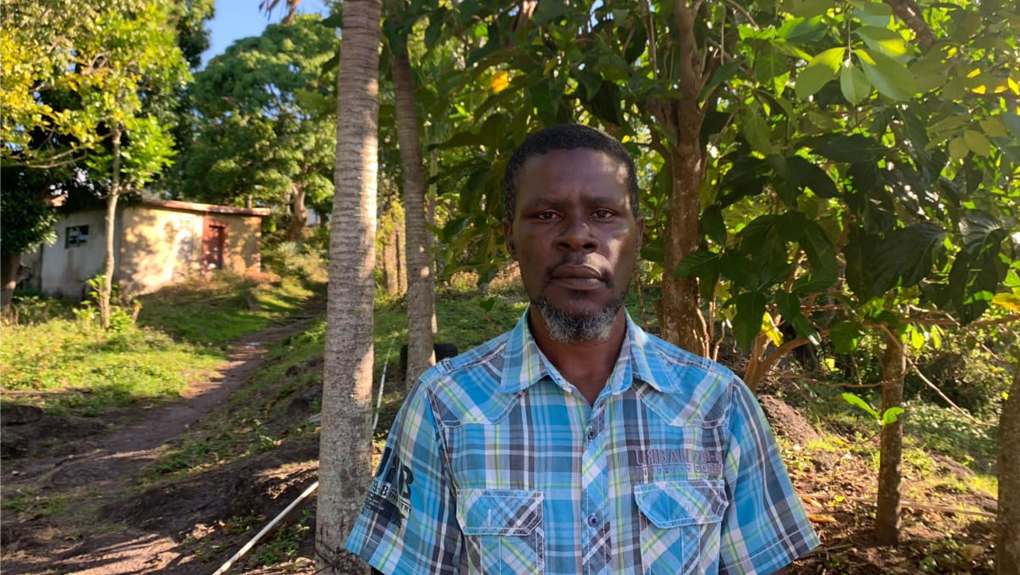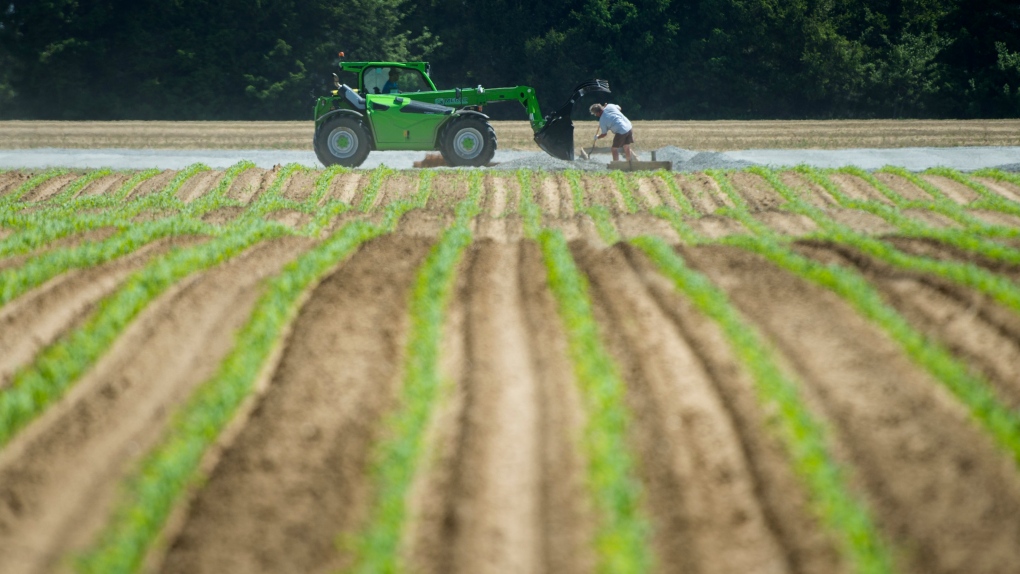Ontario launches review into workplace injury pay after Jamaican migrant workers win legal battle
The provincial government is reviewing how workplace safety claims filed by seasonal farm workers are handled following a years-long appeal by four Jamaican migrants who were permanently injured on the job.
The six-month review was launched on Sept. 22, the Workplace Safety and Insurance Board (WSIB) confirmed in a statement to CTV News Toronto.
It will examine how Seasonal Agricultural Worker Program (SAWP) employee claims are distributed – and for how long injured migrant workers can receive payments.
The probe follows an appeal launched by the group of workers, all of whom were permanently injured in separate workplace incidents on Ontario farms between 2006 and 2017, and told by the WSIB they were only entitled to loss of earnings benefits equal to 12 weeks or less after being sent back to their home countries.
In the case of a workplace injury, the WSIB offers reimbursement for a loss of earnings while off work – usually, for up to 12 weeks. A worker receiving Loss of Earning benefits gets 85 per cent of the difference between their pre-accident earnings and the amount that they are able to earn in “suitable and available” employment after the injury.
In their appeal, the workers argued they were entitled to greater compensation, as the toll of their injuries extends far past a 12-week timeline.
The workers won their appeal. In a Sept. 15 decision by the Workplace Safety and Insurance Board Appeals Tribunal, chair Rosemarie McCutcheon recognized the undisputed existence of systemic anti-Black racism and precarious employment entrenched in the Seasonal Agricultural Worker Program (SAWP), which arranges farmers, primarily from Jamaica and Mexico, to work in Canada for eight months.
According to one advocacy group, the decision has the power to set a precedent that could improve the lives of migrant workers.
“I think this is going to show that the system hasn’t worked,” Chris Ramsaroop with Justice for Migrant Workers told CTV News Toronto. “And it is imperative for the WSIB to address this and follow this process for other workers who are injured.”
‘A HARD ROAD’
By the time Leroy Thomas, a 48-year-old farmer from Jamaica, slipped on a wet tire while climbing a tobacco wagon, falling several feet onto the concrete below, he had been working seasonally in Ontario for 16 years.
The Sept. 14, 2017 incident left him with a strained lower back and a bulging disc, compressing a nerve, he explained.
“How am I going to survive? I have my family to take care of,” Thomas said after learning of his injuries.
 Leroy Thomas, a 48-year-old farmer from Jamaica, worked at Ontario farms for 16 years.
Toronto lawyer Maryth Yachnin has represented Thomas and the three other injured migrant workers since 2006 in their battle for comprehensive coverage.
Leroy Thomas, a 48-year-old farmer from Jamaica, worked at Ontario farms for 16 years.
Toronto lawyer Maryth Yachnin has represented Thomas and the three other injured migrant workers since 2006 in their battle for comprehensive coverage.
“All of them have lost their livelihoods from the injuries they suffered at work, none have had any financial support on an ongoing basis from the Workplace Safety and Insurance Board, despite the fact that their injuries stopped them from returning to work,” Yachnin said.
After his injury, Thomas said his life began to crumble. He was sent back to Jamaica in November 2017, no longer able to work as a farmer in Canada or as a barber in his home country. His marriage fell apart, he said.
With mounting medical bills and no way to earn an income, he was no longer able to support his kids. At times, he says he didn’t have enough money to buy food.
“It’s devastating [...] It sends you into depression,” Thomas said. “It has been a hard road, a very, very hard road.”
On top of his physical injury, Thomas was diagnosed with Post-Traumatic Stress Disorder in 2019.
In Thomas’ case, the WSIB ended his benefits after he was deemed once again able to work. They said that he could theoretically work as a parking lot attendant in Ontario. But after his injury, he had to move back to rural Jamaica, where that job and its accompanying salary do not exist.
 A farm in Norfolk County, Ont. is seen in this 2020 file photo. THE CANADIAN PRESS/Nathan DenetteThe WSIB decision was based on the idea that if he could work as a parking lot attendant, he would be making approximately the same salary as his pre-accident job, and as a result, there would be no wage loss. But in reality, the tribunal found that wasn’t the case.
A farm in Norfolk County, Ont. is seen in this 2020 file photo. THE CANADIAN PRESS/Nathan DenetteThe WSIB decision was based on the idea that if he could work as a parking lot attendant, he would be making approximately the same salary as his pre-accident job, and as a result, there would be no wage loss. But in reality, the tribunal found that wasn’t the case.
Yachnin called the WSIB’s practice of selecting unrealistic “phantom” jobs for Thomas and the other workers a “xenophobic process” that entertains the false notion that foreign employees are able to return to Ontario at their whim, while treating the same migrants as “disposable” once they are no longer of use to the program.
“The tribunal recognized the importance of thinking about systemic anti-Black racism, and also, it considered the the structures that create precariousness among workers in this particular Seasonal Agricultural Worker Program,” Yachnin said.
REVIEW LAUNCHED
When reached for comment, WSIB Public Affairs Manager Christine Arnott told CTV News Toronto Tuesday it would be conducting a review of how it processes and handles claims for migrants in the SAWP program.
“To ensure we are taking a consistent and fair approach that recognizes the realities of people’s local labour markets after they return home, the WSIB will be conducting a review of how claims for people in the federal Seasonal Agricultural Worker program are handled,” Arnott said.
The review is expected to be completed within six months, she said.
According to Arnott, there have been differing views shared over the recent years on how to determine work that is “suitable and available” for an injured or ill migrant worker after they return to their home country – the review will aim to clarify those definitions.
“This review will clarify how the claims are adjudicated and will determine whether previous decisions should also be adjusted,” Arnott said.
Workers whose claims are under review should be contacted by the WSIB directly within the coming weeks, she said.
Going forward, Yachnin said it will be critical to rectifying the current “unjust practice towards racialized migrant workers” who were permanently injured, lost their livelihoods here and in their home countries – and got nothing.
SIGNIFICANT CHALLENGES OVERCOME: LABOUR LAWYER
Toronto labour lawyer Roberto Henriquez, who was not involved with the September decision, said the challenges overcome to achieve this review were significant.
Often workers are disincentivized to speak out about poor working conditions, he said.
“The system itself functions in a way that effectively disciplines the people who speak out,” Henriquez said, referencing the risk of raising concerns in an environment in which an employee can be sent home and lose access to a primary source of income at any point in time.
The second barrier would have been simply navigating the WSIB system in the first place, he continued.
“There are employees who simply don't know how to access the system, don't necessarily know that the system exists and don't know what protections exist for them,” he said.
Touching on the newly announced review, Henriquez said it could serve as a sign that the agency is “recognizing and accepting” the tribunal decision and assessing how to implement the findings outlined going forward.
For Thomas, the decision to speak out came from a hope that, in bringing his case forward, a ripple of change would reverberate through the program.
“When I decided to do this, I wanted someone else to hear the changes they need to make in the WSIB system,” he said.
“Just imagine that you have an injury and you can’t work, and a system is there to help and they are not doing what they're supposed to do.”
CTVNews.ca Top Stories

Donald Trump says he urged Wayne Gretzky to run for prime minister in Christmas visit
U.S. president-elect Donald Trump says he told Canadian hockey legend Wayne Gretzky he should run for prime minister during a Christmas visit but adds that the athlete declined interest in politics.
Historical mysteries solved by science in 2024
This year, scientists were able to pull back the curtain on mysteries surrounding figures across history, both known and unknown, to reveal more about their unique stories.
King Charles III focuses Christmas message on healthcare workers in year marked by royal illnesses
King Charles III used his annual Christmas message Wednesday to hail the selflessness of those who have cared for him and the Princess of Wales this year, after both were diagnosed with cancer.
Mother-daughter duo pursuing university dreams at the same time
For one University of Windsor student, what is typically a chance to gain independence from her parents has become a chance to spend more time with her biggest cheerleader — her mom.
Thousands without power on Christmas as winds, rain continue in B.C. coastal areas
Thousands of people in British Columbia are without power on Christmas Day as ongoing rainfall and strong winds collapse power lines, disrupt travel and toss around holiday decorations.
Ho! Ho! HOLY that's cold! Montreal boogie boarder in Santa suit hits St. Lawrence waters
Montreal body surfer Carlos Hebert-Plante boogie boards all year round, and donned a Santa Claus suit to hit the water on Christmas Day in -14 degree Celsius weather.
Canadian activist accuses Hong Kong of meddling, but is proud of reward for arrest
A Vancouver-based activist is accusing Hong Kong authorities of meddling in Canada’s internal affairs after police in the Chinese territory issued a warrant for his arrest.
New York taxi driver hits 6 pedestrians, 3 taken to hospital, police say
A taxicab hit six pedestrians in midtown Manhattan on Wednesday, police said, with three people — including a 9-year-old boy — transported to hospitals for their injuries.
Azerbaijani airliner crashes in Kazakhstan, killing 38 with 29 survivors, officials say
An Azerbaijani airliner with 67 people onboard crashed Wednesday near the Kazakhstani city of Aktau, killing 38 people and leaving 29 survivors, a Kazakh official said.

































